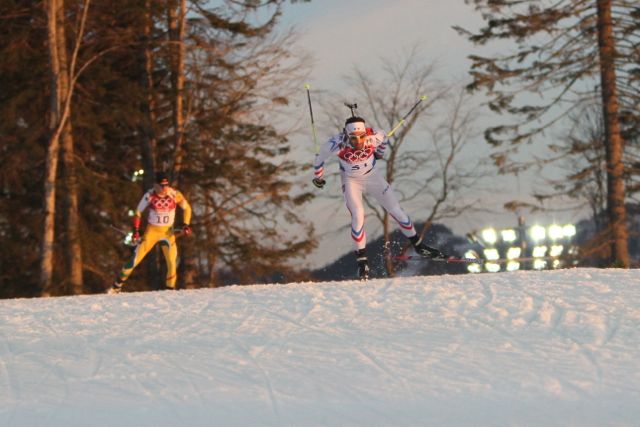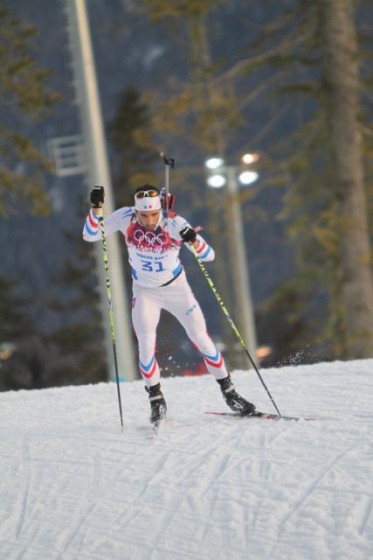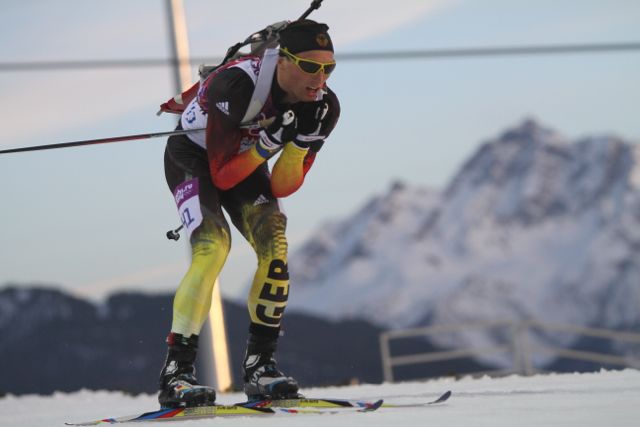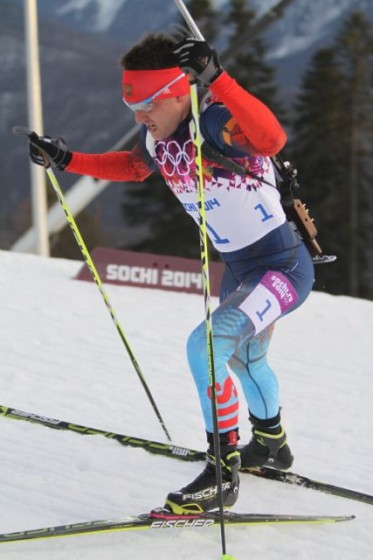
FasterSkier’s coverage is made possible through the generous support of Rudy Project.
SOCHI, Russia – For the last several years, it’s been clear that Martin Fourcade is the best biathlete in the world.
Did he fall short at big events sometimes? Yes – the Norwegians, among others, showed up with their “A” game and the perfect peaking plan at 2013 World Championships, taking three individual golds to the Frenchman’s one.
And did he mess up sometimes, on the big stage? Yes – like in the opening mixed relay in Östersund, Sweden, this year, when he not only missed four shots in the standing stage, but forgot to use all of his spare rounds and earned his team a two-minute penalty.
And yes, there have been races where Fourcade didn’t seem like himself – missing shots or skiing anything other than the fastest split time of the day. This year, there have been questions of whether the pressure of an Olympic season was getting to him. They were never stronger than on Saturday, when he missed one shot, skied the second-fastest time, and still ended up somehow in sixth place instead of on the podium.
But it is the Frenchman’s style to take each of these incidents and bounce back with an even bigger and bolder show of success. Here at the Olympics, Fourcade made his first statement by winning Monday’s 12.5 k pursuit in dominant fashion.
Today, he furthered his claim as best biathlete in the world by skiing to a 12-second win in the 20 k individual. It was the first time since 1968 that a French athlete has won two gold medals at the same Games.
“It is a really different feeling from two days ago, which was a lot of relief,” Fourcade said in the press conference. “I’m just incredibly happy and it’s a wonderful thing.”

Fourcade picked up a penalty in his second of four shooting stages. In the individual format, each missed shot is penalized by one minute of added time, so Fourcade had knocked himself out of medal position at the race’s halfway point. But he was clean for the rest of the race climbing back into the lead as other competitors accumulated penalties and slower ski times.
And then he had to wait.
Because how good is Fourcade? That has been the question all year. Is he one minute, and thus one penalty, better than the rest of the field? Two minutes? Three minutes over 20 kilometers?
“You are just by yourself,” Fourcade said of the individual format. “You have four firing lines, four shooting rounds. And all the mistakes, they cost a lot. I had to be in my top form.”
Even with one miss, it would take perfect shooting for one of his competitors to beat Fourcade and earn that minute of penalty time back. Before Fourcade had made it to the final stage, an earlier-starting athlete, Dominik Landertinger of Austria, had cleaned all four stages. Landertinger wasn’t skiing fast enough to contend with Fourcade – his ski time was almost two minutes slower – so Fourcade could relax knowing that his gold was safe from this threat.
But it showed that on the quiet, windless Sochi range, it was definitely possible that more people would shoot clean. And soon, one did.
Erik Lesser of Germany came into the range for the final time tired and shaking. He was clean so far, and knew that any errors would destroy the good race he had going. So he shot very slowly, but methodically knocked down all five targets. Based on Fourcade’s split times, Lesser had a ten-second advantage heading into the final four kilometers.
Could he take the gold away from the most dramatic competitor on the circuit?
“To be honest, yes I had that thought,” Lesser said in the press conference. “I tried to do my best during the final loop and I hoped that my colleague from France wouldn’t be that fast.”

But while Fourcade had turned in what ended up as the fastest finishing-loop time, as well as the fastest overall ski time, Lesser couldn’t quite do it. He slowly hemorrhaged seconds to Fourcade and eventually ended up in second.
“Well, it didn’t happen!” Lesser laughed. “But nevertheless I consider this to be a great success for me. It was a major success. At some point I was even thinking about winning a gold medal, but one cannot be disappointed with a silver medal at all.”
After Lesser, only Anton Pantov of Kazakhstan cleaned, but was so much slower on his skis that he only finished 27th.
For Fourcade, the day was more relaxed than his pursuit win, because it was not head-to-head racing and he was out on the trails alone with fewer head games.
“The emotions were different, because this was an individual race and we had less excitement and less pressure,” he said. “I knew what I had to do and I love individual races. Of course I was a favorite and I knew that I will be doing well. I almost fell down but the most important thing was to stay put…. I wouldn’t complain about the two golds.”
While he has made history for France and is jet-setting into the history books for his sport, he said that he doesn’t consider himself alongside Ole Einar Bjørndalen, the Norwegian who won his 12th Olympic medal in Saturday’s sprint, or Fourcade’s countryman Raphael Poirée, who won 44 World Cup races before retiring.
“I love sports but I never thought about becoming part of history and part of this,” Fourcade said. “But I am happy and I would like to share my happiness with my teammates and my friends. Maybe this is why I am good at what I am doing.”
The other podium finishers were doing it for history in a different sort of way. Lesser’s grandfather Axel Lesser was an East German cross country skier who competed in the 1976 Olympics. In the relay, he was in second place but collided with a spectator and was injured, and had to withdraw from the race. Today, his grandson paid that debt back.
The younger Lesser has said that he considers his grandfather his hero, along with Bjørndalen.

“For me, the opportunity to win an Olympic medal is a great opportunity and especially having such a relative,” he said.
On top of that, Lesser’s great-grandfather really wanted to see him race in the Olympics (this is 25-year-old Lesser’s first Games, after he broke through on the World Cup circuit with his first podium last season).
“He is quite old, by the way,” Lesser said of his 93-year-old great-grandfather. “He was anxious to see my first Olympic Games [while he was still alive]. I promised him that I could do that. I am happy that he could see this result.”
The bronze medal went to Evgeniy Garanichev of Russia, an early leader – the earliest leader, actually, after having started in bib number one. With a single penalty and the second-fastest ski time, Garanichev held onto the lead for 15 minutes after he crossed the finish line.
That’s the thing about in individual race: it’s a waiting game.
“When I was changing, our therapist came and we heard through the walkie-talkie the info about athletes arriving,” Garanichev said through a translator. “The coaches told us everything about what was happening. I didn’t think about it – I was satisfied with my race and my shooting. Only after a little bit of time, I went out and started watching.”
By then, Fourcade had surpassed his time by 34.5 seconds. And later, Lesser bumped Garanichev down one spot further to bronze.
The result was Russia’s second biathlon medal of this home Games, although they have yet to win gold. But Garanichev, too, was charting a course into the history books. He won his bronze on his 26th birthday, and is believed to be the first athlete to win an Olympic medal on their birthday.
It was a good present.
“I think one always has some hope,” he said. “This is what you’re looking for this is what you prepare for. The Olympics only happen once in four years. So you start to be optimistic and you do your best every time you race.”
Austria was narrowly edged out of the medals, with Simon Eder finishing three seconds down on Garanichev and the clean-shooting Landertinger landing in fifth. Jean Guillaume Beatrix of France continued his stellar Olympics by placing sixth with one penalty, while Emil Hegle Svendsen of Norway, on the opposite end of the spectrum, continued to disappoint in seventh, also with a single penalty.
“Normally on a day like this I’d be fighting with Fourcade,” Svendsen told Norways’ NRK broadcaster. “I’m surprised that I’m so far behind. I’m disappointed and sad.”
Chelsea Little
Chelsea Little is FasterSkier's Editor-At-Large. A former racer at Ford Sayre, Dartmouth College and the Craftsbury Green Racing Project, she is a PhD candidate in aquatic ecology in the @Altermatt_lab at Eawag, the Swiss Federal Institute of Aquatic Science and Technology in Zurich, Switzerland. You can follow her on twitter @ChelskiLittle.



